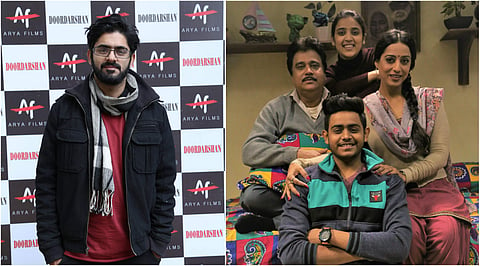

In the 1980s, television programming in India was synonymous with Doordarshan. Before the advent of private networks, India’s only public service broadcaster was also its prime source of entertainment. Epic shows like Ramayana and Mahabharata as well as serialised dramas like Hum Log, Buniyaad, and Malgudi Days marked the heyday of Doordarshan — India’s homegrown proto-Netflix.
Director Gagan Puri’s new comedy, Doordarshan, reverts back to that forgotten time. Unfolding in Delhi, the film tells the story of a family stuck between the present and the past. When the grandmother (Dolly Ahluwalia) wakes from a comatose state, the remaining members conspire to protect her from shock. They install an old television set in her room and convince her she’s still living in the past. The film, which shares its premise with the 2003 German film Good Bye, Lenin!, stars Mahie Gill and Manu Rishi in the lead, with supporting turns by Rajesh Sharma, Supriya Shukla, and Shardul Rana.
“I wrote the film in 2011,” shares Gagan, who has previously directed the horror thriller The Past. “I grew up in Delhi in the late 80s. Shows like Krishi Darshan, Chitrahaar, and the radio programme Binaca Geetmala defined my childhood. We had an analogue TV set at home where I watched classic films like Raaj Kumar’s Neel Kamal (1968). The idea was to play with these memories and create a story.”
In addition to small screen nostalgia, Gagan wanted to capture the disintegration of our family structure. With the economic liberation of the 1990s, Indian families moved away from joint to nuclear units. Fast-paced city life replaced the collective existence of old. Delhi, though, remained a mixture of generations and aspirations. “Although I did not grow up in a joint family, I always had uncles and aunts advising me on my career. They did not want me to go to Mumbai because of the ‘struggle’ that waited there. So the conflict between individual choice and family compulsion will always exist, even within nuclear units. It’s a matter of personal choice how you want to navigate it.”
Mahie, who grew up in Chandigarh, relates to the film’s slice-of-life tone. The actor says she wanted to break free of her ‘sensuous’ tag — a label that has followed her from Dev D and the Saheb Biwi Aur Gangster franchise to more recent works. In Doordarshan, she plays Priya, a boisterous woman who wants a divorce from her husband. “I had done comedy in the Punjabi film Carry On Jatta (2012) but not like this,” Mahie says. “It’s full of situational humour. I’m not doing buffoonery or making faces. It was a perfect script for me to try something different.”
Mahie recalls the golden age of Doordarshan and its quality programming. “You had such varied and engaging shows — from Vikram Aur Betal and Karamchand to Dekh Bhai Dekh and Fauji. Today, television writing has become focused on specific audience groups. Back then, you could watch these shows with the entire family. It was a hugely communal experience.”
Mahie’s co-star, Manu Rishi Chaddha, has been a part of several iconic Delhi films. He’s best remembered as the street-smart sidekick Bangali from Dibakar Banerjee’s Oye Lucky! Lucky Oye! (2008). Other mentions would include Ankhon Dekhi and Kya Dilli Kya Lahore. Like many of his peers, the actor-turned-writer started out in Delhi’s theatre scene. He spent six years with the Asmita theatre group and acted in over 40 plays by theatre legend Arvind Gaur. Moving to Mumbai in the early 2000s, Manu made his acting debut in Saathiya. As a writer, his credits include Oye Lucky! Lucky Oye! (dialogues), Rajma Chawal, Nanu Ki Jaanu, and others. Recently, Manu played the role of Gajraj Rao’s brother in Shubh Mangal Zyada Saavdhan.
“In my 20-year career, Doordarshan is the first film where someone has cast me in the lead,” Manu shares. “Our producers (Ritu and Sandeep Arya) could have opted for a big star. But they trusted me because of my familiarity with the milieu.”
The actor confesses he was initially nervous about the film securing a release. “I was not sure how they were going to sell this,” he smiles. “But now that Shubh Mangal Zyada Saavdhan has also worked, I am hoping audiences would come to watch this film too. I am guessing it’s because of the personal connection with the subject.”